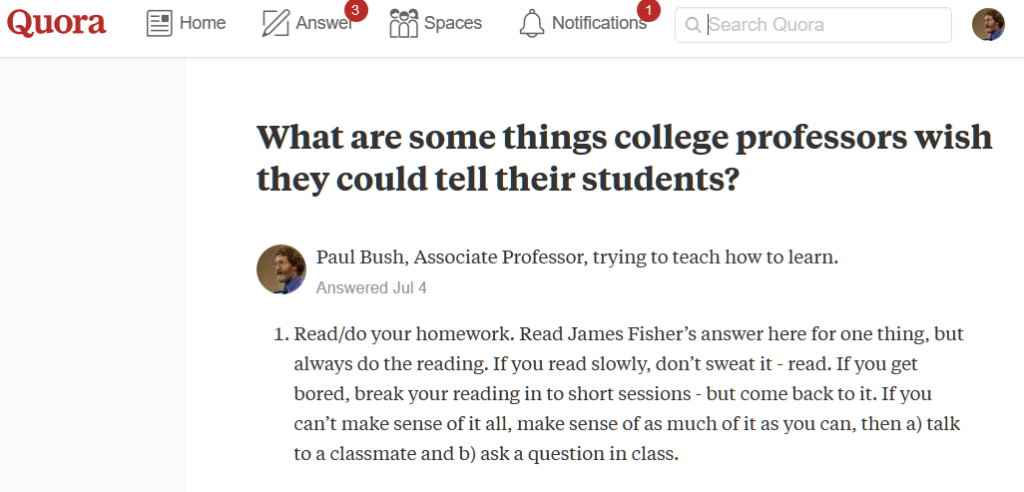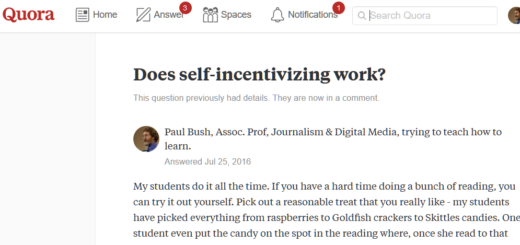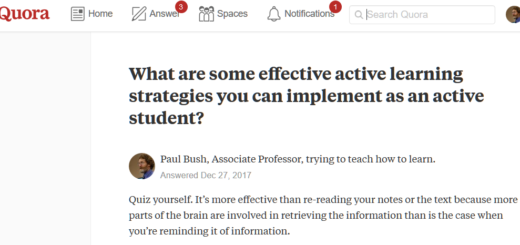A Quora question: What are some things college professors wish they could tell their students?
by Paul Bush · June 27, 2019
Paul Bush, Associate Professor, trying to teach how to learn.
- Read/do your homework. Read James Fisher’s answer here for one thing, but always do the reading. If you read slowly, don’t sweat it – read. If you get bored, break your reading in to short sessions – but come back to it. If you can’t make sense of it all, make sense of as much of it as you can, then a) talk to a classmate and b) ask a question in class.Never blow off class assignments. Just don’t. Keep reading to figure out why I’m not elaborating on this.
- Map out every spare hour in your week not spent in class, at practice, at a job or internship, at meals or asleep. Then see every spare 1/2 hour or hour as a chance to study or do other classwork.
- Study in the library. If you can’t find a study space there, then find someplace else that’s quiet. Then use that space. Don’t let your video-playing roommate, your noisy hall, etc. be a distraction that keeps you from getting your work done.
- Change your attitude about socializing. (I didn’t mention anything about hanging out with your buddies in #2, did I?) Making friends is an important part of going to college, but chillin’, binge watching and partying
 shouldn’t be so important that you put them before learning.And while we’re talking about social experiences, bring a professional attitude to group work. You’re there willing to work and it’s only reasonable that you can expect the same of others. If someone in your group isn’t carrying their share of the load, stand up for yourself. Don’t shoulder their burden. Talk to your group, talk to the individual and then talk to the professor if that’s the only recourse left.
shouldn’t be so important that you put them before learning.And while we’re talking about social experiences, bring a professional attitude to group work. You’re there willing to work and it’s only reasonable that you can expect the same of others. If someone in your group isn’t carrying their share of the load, stand up for yourself. Don’t shoulder their burden. Talk to your group, talk to the individual and then talk to the professor if that’s the only recourse left. - Realize that college is an atypical part of the capitalist economy. Sure, you’re paying money, but you’re not buying a degree. You’re buying an opportunity to learn and to grow. Which means that you’re paying money for the chance to work hard, so don’t blow that chance.
- Sleep, exercise and try to eat right. No one’s going to tell you when to go to bed, but if you want your brain to work at peak efficiency you need to sleep 8 hours or more a night. Sleep is when the brain consolidates memories, so it’s a time when your learning starts to stick. It’s also thought to be when your brain cleans out waste byproducts created during the day.Exercise proves to be more important than you think. It contributes to the growth of new brain cells. It clears out cortisol, the stress hormone, helping to counteract depression and anxiety, which interfere with learning. You don’t have to do a lot, you don’t even have to do the same thing every day, but your brain needs you to do it.Eat some vegetables – and french fries don’t count. Okay, if you exist on a diet of carbohydrates and protein (i.e., hamburgers and fries) this is the recommendation that you’re least likely to follow, but try adding vegetables to your diet for a month and see if you don’t feel better.
- Never cram and always quiz yourself. If you want to retain knowledge, instead of having all that cramming evaporate in a day or so, spread your test-preparation over a week or more. Take a day off in between prep days. If you gave yourself enough time, take two days off. This is called spaced repetition and maximizes the consolidation of memory.Don’t rely on re-reading the text or your notes when you study. Ask yourself questions about the material. It forces your brain to go seeking the answers, making it form stronger connections between neurons, which is where memories reside. This is at play in spaced repetition, as well: your brain strengthens the neural connections, making it more likely that it can access that information later – maybe even after the semester is over.
27.8k views · You can find this piece on Quora by clicking here.



